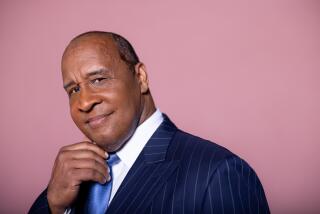Yazoo River is not the only dividing line
GREENWOOD, MISS. — The year America inaugurated its first black president will also be known as the year this small Delta cotton hub voted its first black mayor out of office.
Mayor Sheriel F. Perkins was up for reelection Tuesday, running on a promise to “move Greenwood forward, together.” But half a century after the ugliness that reigned here during the civil rights era -- black voter registration efforts met with beatings and police dogs -- this city of 18,000 has settled into a civil but enduring separateness.
The muddy Yazoo River cuts through the heart of town, serving as the unofficial boundary between black and white Greenwood. The black majority is to the south, in middle-class bungalows and decrepit shotguns. The white minority lives mostly in the north in handsome suburban-style homes.
When Perkins, 53, a longtime City Council member, ran against a white incumbent in 2006, only 67 north-side residents voted for her -- out of 3,135 votes cast there.
On Tuesday, north Greenwood’s wide, well-tended lawns were festooned with forest-green signs touting the new challenger, Carolyn McAdams. She is white. White adults waved campaign signs at passing drivers. White children were everywhere in green campaign T-shirts.
McAdams, 61, had cast herself, as had Perkins, as a unifying figure.
Many blacks, she said, had come to trust her in her years working at the nearby private prison and, before that, at the housing authority.
“They know that I’m fair,” she said. “I don’t see color.”
But color, as many voters acknowledged, was at the heart of this election. McAdams’ supporters had few direct criticisms of the sitting mayor’s performance, though some were turned off by her numerous liens for nonpayment of taxes.
What they really didn’t like, they said, was the black political clique surrounding her -- especially the clique’s gray eminence, state Sen. David Jordan. It was Jordan, 76, who filed a lawsuit that ultimately led to blacks being elected to the City Council, where they have held a majority for a number of years.
These days, white voters said in interviews, it seemed like it was the black clique that was dividing the city by constantly playing the race card.
“They keep something going all the time between the blacks and whites,” said Betty Killebrew, 72. “And it doesn’t need to be that way.”
By many measures, Greenwood has made remarkable strides in race relations. So has the state. Another Mississippi town with a cruel segregationist past, Philadelphia, made nationwide headlines last month when it elected its first black mayor.
On Tuesday, the atmosphere here was perfectly friendly. Marquii Washington, one of a handful of blacks standing by a Perkins sign on the north side, said whites asked after him throughout the hot day, offering him cold drinks and shade.
But as Washington watched whites flock to their polling places, he encountered a number of blacks who told him they weren’t going to vote.
On the south side, Perkins volunteer Mac Henry was trying to combat black apathy, roaming around the tumbledown homes of the Baptist Town neighborhood in a van and shuttling voters to the polls.
Henry used the old Malcolm X formulation about “field Negroes” and “house Negroes” to explain why whites didn’t like the ruling black clique: People like Sen. Jordan, he said, were from the field -- fighters, not pushovers. The mayor, he said, was from neither house nor field, but a “breakout” character who could bring real unity.
At dinnertime, Perkins’ supporters gathered in a church basement and fell silent as they watched the poll results roll in like a bad storm: 57% for McAdams, 43% for Perkins. In the north, Perkins received 54 votes.
Perkins, arriving a few minutes later in a sundress, tried to keep things upbeat. Losing, she said, must have been God’s plan for her.
Across the river, McAdams’ backers toasted in the white-columned mansion of a local lawyer. The beaming McAdams spoke briefly, promising a “united front” for Greenwood.
A few black faces mingled happily in the crowd. McAdams had earned about 270 south-side votes: Some of them had grudges against the mayor, and some simply thought she had done a poor job.
At one point, a group of black women burst into a few bars of a song that had been on everyone’s lips back in 1964: “A Change Is Gonna Come.”
--
More to Read
Get the L.A. Times Politics newsletter
Deeply reported insights into legislation, politics and policy from Sacramento, Washington and beyond. In your inbox three times per week.
You may occasionally receive promotional content from the Los Angeles Times.










